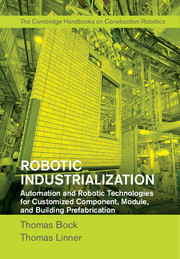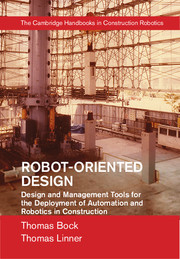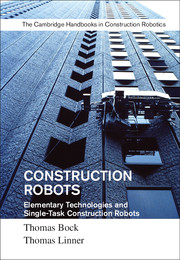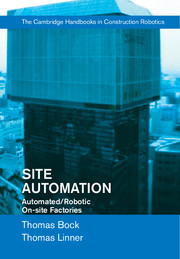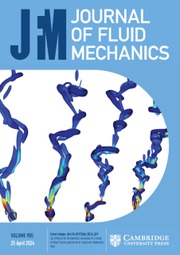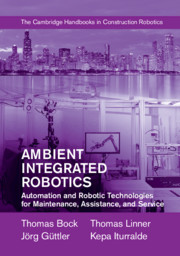Robotic Industrialization
Automation and Robotic Technologies for Customized Component, Module, and Building Prefabrication
- Authors:
- Thomas Bock, Technische Universität München
- Thomas Linner, Technische Universität München
- Date Published: July 2015
- availability: This ISBN is for an eBook version which is distributed on our behalf by a third party.
- format: Adobe eBook Reader
- isbn: 9781316383001
Find out more about Cambridge eBooks
Adobe eBook Reader
Other available formats:
Hardback
Looking for an inspection copy?
Please email academicmarketing@cambridge.edu.au to enquire about an inspection copy of this book
-
In this volume, concepts, technologies and developments in the field of building-component manufacturing - based on concrete, brick, wood and steel as building materials and on large-scale prefabrication, delivering complex, customized components and products - are introduced and discussed. Robotic industrialization refers to the transformation of parts and low-level components into higher-level components, modules and finally building systems by highly mechanized, automated, or robot-supported industrial settings in structured off-site environments. Components and modules are open building systems (in modular building product structures) that are delivered by suppliers to original equipment manufacturers such as, for example, large-scale prefabrication companies or automated/robotic on-site factories. In particular, innovative large-scale prefabrication companies have altered the building structures, manufacturing processes, and organizational structures significantly to be able to assemble in their factories high-level components and modules from Tier-1 suppliers into customized buildings by heavily utilizing robotic technology in combination with automated logistics and production lines.
Read more- A new interpretation of architecture and construction as a manufacturing industry that deals with product rather than with buildings: from building 'construction' to building 'production'
- Follows a cross-disciplinary approach that relates traditional architectural and construction knowledge with the latest knowledge from manufacturing, automation and robot technology
- Oriented towards technology application: shows by real world case studies application scenarios for each presented approach or technology and thus gives a good guide to real world implementation
Customer reviews
Not yet reviewed
Be the first to review
Review was not posted due to profanity
×Product details
- Date Published: July 2015
- format: Adobe eBook Reader
- isbn: 9781316383001
- contains: 482 b/w illus. 85 tables
- availability: This ISBN is for an eBook version which is distributed on our behalf by a third party.
Table of Contents
1. Introduction
2. Automation and robotics in building-component manufacturing
3. Building-module manufacturing
4. Comparison of large-scale building manufacturing in different countries
5. Large-scale building-system manufacturing in Japan.
Sorry, this resource is locked
Please register or sign in to request access. If you are having problems accessing these resources please email lecturers@cambridge.org
Register Sign in» Proceed
You are now leaving the Cambridge University Press website. Your eBook purchase and download will be completed by our partner www.ebooks.com. Please see the permission section of the www.ebooks.com catalogue page for details of the print & copy limits on our eBooks.
Continue ×Are you sure you want to delete your account?
This cannot be undone.
Thank you for your feedback which will help us improve our service.
If you requested a response, we will make sure to get back to you shortly.
×
